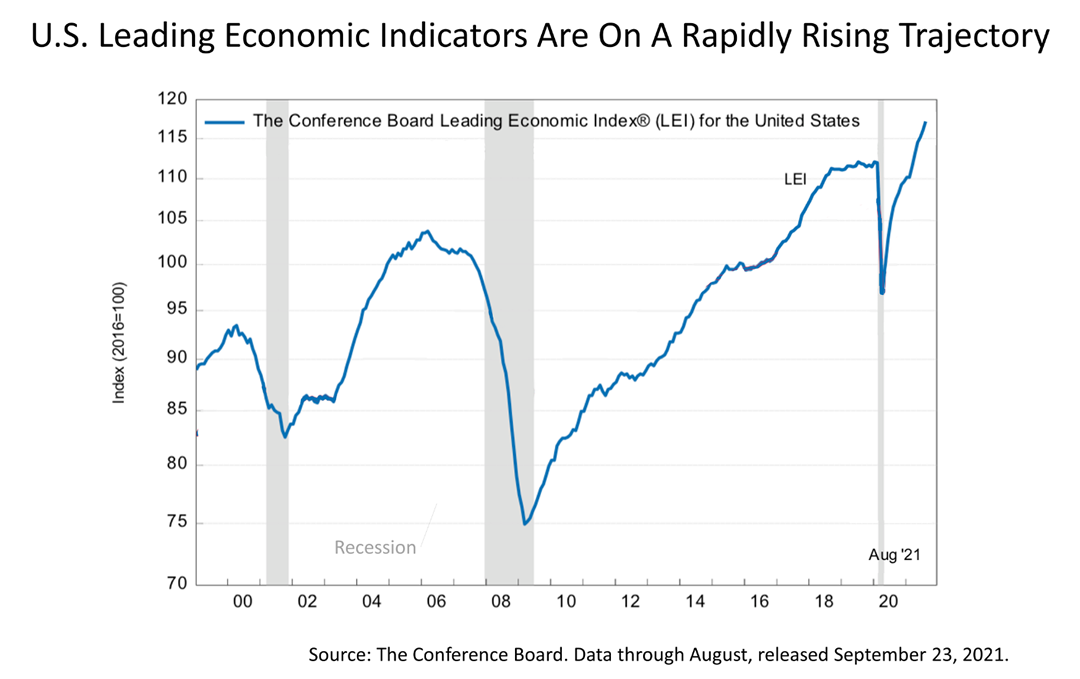
The Standard & Poor’s stock index dropped 2% yesterday and U.S. Secretary of the Treasury Janet Yellen, testifying before the Senate Banking Committee, warned of “catastrophic” consequences if Congress failed to come to an agreement on the debt ceiling by October 18. Meanwhile, a showdown is looming in Congress over raising the United States government’s debt limit and how much to spend to improve the nation’s infrastructure, as well as the size of the budget for the approaching fiscal year ending September 30, 2022. Despite the grim financial headlines in recent days, the U.S. Leading Economic Indicators (LEI) index is signaling robust growth is ahead, and the LEI has a history for being a reliable indicator of future growth. The LEI plunged before every recession in modern history except for the Covid recession. Keep in mind, a bear market in stocks has been triggered by every recession in modern history except for the crash of 1987. These two historical facts make the LEI an important forward-looking indicator of financial economics.
The LEI is a broad indicator of what’s ahead, reflecting recent financial news because it is comprised of 10 components: - average weekly hours worked in manufacturing
- average weekly initial unemployment claims
- manufacturers’ new orders – consumer goods and materials
- Institute of Supply Management index of new orders index
- manufacturing sector new orders, nondefense capital goods
- building permits – new private housing units
- stock prices, as measured by the S&P 500
- Leading Credit Index™
- interest rate spread of the 10-year Treasury Bond minus the Fed Funds Rate
- index of consumer expectations.
With the LEI rising sharply again in August, the index is higher than ever. Meanwhile, the Conference Board, an association for U.S. corporate giants that administers the LEI, says the LEI “remains on a rapidly rising trajectory.” While the Delta variant and inflation fears could, in the near-term, raise unemployment and cool consumer spending, the trend in the LEI is consistent with robust economic growth for the remainder of 2021.This is not to downplay the risk of Washington, D.C. dysfunction. Congress conceivably could undermine the economy by causing the government to default, which would be bad for stock prices. But Congress is unlikely to cause a self-inflicted wound by failing to agree on the debt ceiling, as it has done every year since 1917, when the debt ceiling became federal law. The Conference Board economics team expects real annual growth of the United States of nearly 6% in 2021, before easing to a robust growth rate of 4% in 2022, and Congress has until October 18 to figure out the way forward on budget and infrastructure legislation. Nothing contained herein is to be considered a solicitation, research material, an investment recommendation, or advice of any kind, and it is subject to change without notice. Any investments or strategies referenced herein do not take into account the investment objectives, financial situation or particular needs of any specific person. Product suitability must be independently determined for each individual investor. Tax advice always depends on your particular personal situation and preferences. You should consult the appropriate financial professional regarding your specific circumstances. The material represents an assessment of financial, economic and tax law at a specific point in time and is not intended to be a forecast of future events or a guarantee of future results. Forward-looking statements are subject to certain risks and uncertainties. Actual results, performance, or achievements may differ materially from those expressed or implied. Information is based on data gathered from what we believe are reliable sources. It is not guaranteed as to accuracy, does not purport to be complete, and is not intended to be used as a primary basis for investment decisions. This article was written by a professional financial journalist for Advisor Products and is not intended as legal or investment advice. |